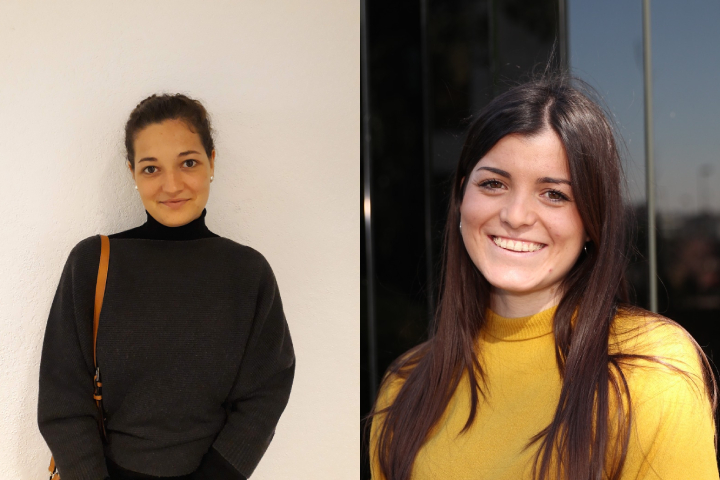11/07/2021 Interview
Maria Guasch Bové and Carmen Alicia Yáez González, students of the masters’ degree in Innovation in Social and Educational Intervention and in Technological Business Management, respectively
“The Aurora course has allowed us to imagine the craziest idea and bring it to fruition”

Maria Guasch Bové and Carmen Alicia Yáez González are students of the URV who have participated in an open international webinar of Aurora network about Artificial Intelligence. They have been trained by international teachers and have developed an educational app with students from foreign countries
Maria Guasch Bové and Carmen Alicia Yáez González are students of the URV who have participated in the open international webinar “Artificial Intelligence in & for the Global South: What is AI and what can it be used for?”. This master-level course is offered by Aurora, an European university partnership in which the URV takes part. This transnational network aims to equip students with the skills and mindset needed to tackle societal challenges as social entrepreneurs and innovators. The course was attended by participants from different countries that collaborated in the design and development of technological solutions with social impact.
Tell us about your experience, what have you learned in this course taught by the Free University of Amsterdam (Vrije Universiteit)?
C.Y.G: During four weeks, we have learned about Artificial Intelligence (AI) from teachers from different universities and received training in developing technological applications related to research. In our case, our task was to design an app to teach math to children from ages seven to nine from a primary school in Sarawak, Malaysia.
Will this app finally be implemented?
M.G.B: Both course coordinators and teachers have liked our project and we have been told that a teacher and a student at Sarawak University in Malaysia will develop the application.
C.Y.G: We worked together with teachers of the school in Malaysia in which the project was going to be implemented and they provided us with all the necessary information and sent us videos of the students using the app.
Do you think your perspective has changed and have you acquired new skills?
C.Y.G: This course has taught us that the starting point to develop a project should always be asking ourselves “What are the needs that have to be fulfilled?”, then you can start thinking about the craziest idea and how to bring it to fruition. This experience has encouraged us to innovate, to go a little further in order to materialize an abstract idea. This approach is closely linked to Artificial Intelligence: envision any project and try to develop it. In addition, working with international students has been an enriching experience, at professional and personal level since we have had the chance to develop our adaptability skills, adopt new approaches to problematics that affect different geographical, economic, cultural and socio-political contexts.
M.G.B: The course has made us realise the many essential needs that need to be addressed and that are everywhere, such as education, which is one of the pillars for development. However, the education and sciences fields don’t seem to be sufficiently valued in our society, facing a very complicated work market.
What is the most relevant outcome of the course?
M.G.B: We’ve had fun time while working on the project and I wish we could continue to participate in similar courses since it’s a great chance to share different perspectives. We were given enough freedom to manage ourselves, which also helped us to manage the time difference with our fellows from the university of Malaysia. Finally, we’ve also agreed to meet in person with our student fellows from Amsterdam.
C.Y.G: Regardless of the area of knowledge you came from, you could join the course and that made us work with a variety of profiles, in our case, with a pedagogy and engineering background. Besides this, knowing that you are developing a project that will have an impact on society makes you want to work extra on the project and even invest some of your free time on it.
